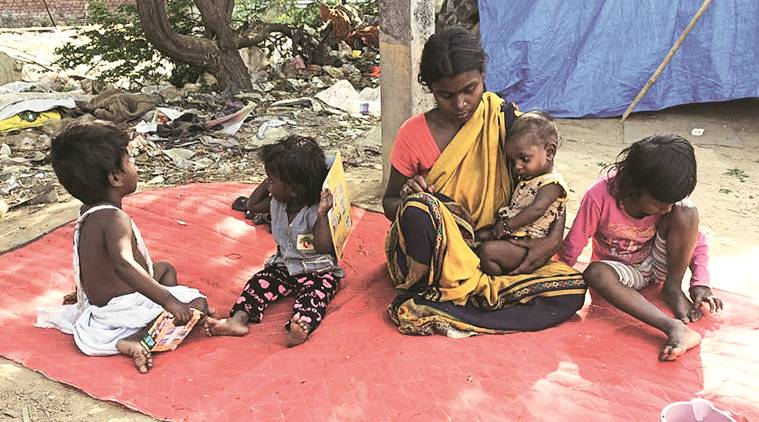Two days after migrant hanged self in Gurgaon, ration for ‘4-5 days’ reaches kin
“Some people came in a tempo this morning and dropped off some dry ration for us — rice, pulses, oil, flour, and some vegetables. They also left us a number to contact them if we need anything more,” said Umesh, Mandal's father-in-law.
 Chhabu Mandal’s wife Poonam and their four children at a shanty in Gurgaon’s Saraswati Kunj. (Express Photo)
Chhabu Mandal’s wife Poonam and their four children at a shanty in Gurgaon’s Saraswati Kunj. (Express Photo)
Two days after Chabbu Mandal (35), a migrant worker from Bihar, committed suicide in Gurgaon, ostensibly over not being able to feed his family during the lockdown, his wife and four young children were handed ration by a citizens’ group on Saturday.
“Some people came in a tempo this morning and dropped off some dry ration for us — rice, pulses, oil, flour, and some vegetables. They also left us a number to contact them if we need anything more,” said Umesh, Mandal’s father-in-law.
The incident took place on Thursday afternoon, when Mandal returned home after selling his phone for Rs 2,500 so he could buy rice, pulses and a portable fan for his family, who live inside two shanties in Saraswati Kunj.
The family said he took the drastic step as he was struggling to provide for them regularly. A painter, Mandal’s work had dried up in the months leading to the lockdown, but the closure across the country made the situation more dire, they said. A day before the suicide, Mandal’s wife Poonam (25) said they had gone hungry.
“The food given to us today will see us through at least four-five days. I don’t know where I would have gone to look for food to feed my children otherwise,” said Poonam, who did not speak more as she was exhausted.
Mandal had been cremated a day earlier.
Officials from the district administration, however, maintained that residents of the area, including Mandal’s family, had been provided both dry ration and cooked meals in the days leading up to his suicide.
The Municipal Corporation of Gurugram’s Joint Commissioner III, Hariom Atri, said, “Our civil defence volunteers had provided dry ration to residents of that area on April 12, and a week earlier as well. Cooked food had also been provided on Thursday and Friday.”
Atri was among the officials who visited Mandal’s family after his death on Thursday. “We spoke to the family and saw that they were provided for. They had dry ration in their home; lack of food was not the reason for the death. I have been providing food to 25,000 people in my area daily; our volunteers have been working in Saraswati Kunj as well,” he said.
“We sent some volunteers to check if the family or others in the area needed ration, but they were well stocked so we did not send anything,” Atri added.
Deputy Commissioner Amit Khatri reiterated this: “Food will be disbursed as per the need. Previously also, it was being distributed in the area, as well as at relief centres nearby.”
Residents, however, said ration and food provided by NGOs and the administration to the slum cluster, comprising migrant workers from Bihar, Bengal, Uttar Pradesh, and Madhya Pradesh, occasionally falls short.
“We are around 2,000 people here, and our shanties are spread out. Some people do come to distribute ration or cooked food, but it is never enough for everyone and is not distributed uniformly. Who gets it depends on luck,” said Dinesh from Uttar Pradesh.
Firoz, a migrant from Bihar involved in construction work, said he and his two younger brothers have to send money back home for their parents, two sisters, a younger brother, as well as Firoz’s wife and four children.
“Before the lockdown, we would get work maybe five days a week,and earn around Rs 500 each. But we would send most of this money home to support our families. Since the lockdown was announced, though, it’s the other way round — we have been asking our parents to send money to us,” said Firoz.







